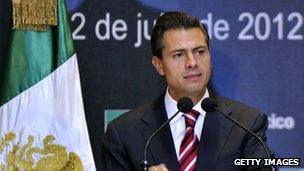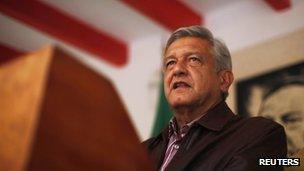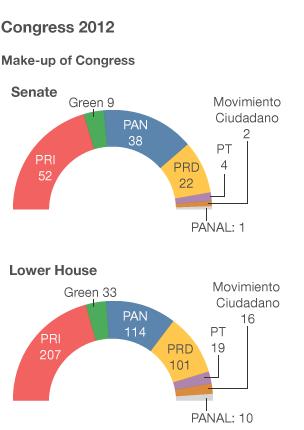Viewpoint: Post-election Mexico faces key reforms
- Published

Reform of state oil company Pemex is a key but highly controversial topic
Enrique Pena Nieto has now had more than a week to consider his victory in Mexico's presidential election, which was confirmed on 5 July by the nation's electoral institute.
For Mr Pena Nieto, the focus is on the transition process leading up to his expected swearing-in as president on 1 December. For his opponents, the focus is on mounting a legal challenge.
Andres Manuel Lopez Obrador, who came second according to the confirmed results, has indicated he will present a court challenge, alleging over-spending and vote-buying by Mr Pena Nieto's Institutional Revolutionary Party (PRI).
Thousands of students protested on the streets of Mexico City and other towns at the weekend against the election result, but the political winds are definitely not blowing in Mr Lopez Obrador's favour.
It seems that there is general acceptance of the results from supporters of the PRI and the current governing National Action Party (PAN).

Mr Pena Nieto: New face or in the grip of the PRI's old guard?
This does not mean Mexicans believe there was no vote-buying; rather they do not see it as having influenced the outcome of the election.
Mr Pena Nieto has been speaking to international media outlets to defend his victory and to reassure the world about the nature of his government.
His <link> <caption>opinion piece in the New York Times on 2 July</caption> <altText>Op-Ed by Enrique Pena Nieto in the New York Times </altText> <url href="http://www.nytimes.com/2012/07/03/opinion/mexicos-next-chapter.html" platform="highweb"/> </link> was particularly noteworthy, as he addressed head-on the question of whether the return of the PRI represented a step backwards for democracy or a bright new future for the country.
This signalling to the world was of course, equally important in terms of the message that it sent to Mexicans.
Mr Pena Nieto wants to show that he recognises the dark past of his party, that he is eager to change the image of the PRI both domestically and globally, and that he represents a more progressive, inclusive party.
Working together?
The legislative balance has also become clearer.
The PRI is the biggest party in both houses of Congress, but failed to win a majority in either.

Mr Lopez Obrador has said he is gathering evidence of fraud
However, with its ally, the Green Party (PVEM), the PRI comes close to a majority in the Chamber of Deputies, and will only require a few extra votes from willing PAN deputies to win approval for the majority of its legislative initiatives.
This will be crucial in determining the prospects for the multiple structural reforms that are pending in Mexico.
Labour, fiscal, education, social security and energy reforms are all seen as vitally important to allow the country to move forward, and Mr Pena Nieto has promised progress on these issues.
However, the PAN will not deliver its votes easily on fiscal and energy reforms, regarded as key to sorting out the federal government's finances and allowing for job creation and progress on competitiveness issues.
Rather, we can expect significant political demands from the PAN on these two issues, which are seen as inextricably linked given the importance of the national oil company, Pemex, for the government's finances.
Pemex question

Indeed, energy reform is generally seen as the acid test for the incoming government, as state ownership of Mexico's natural resources is enshrined in the constitution.
To change Mexico's constitution, two-thirds of deputies and senators must give their approval (as well as a majority of the legislatures of the 31 states).
This gives the PAN its trump card in political negotiations as the leftist party, Mr Lopez Obrador's Party of the Democratic Revolution (PRD), has vowed to oppose any opening up of the energy sector.
And this is why a proposal on energy reform may actually be presented to Congress even before Mr Pena Nieto is due to take office in December.
If a deal can be worked out between the PRI and the PAN, then outgoing President Calderon may be able to marshal the new PAN deputies and senators to ensure their support for the reform.
Mr Calderon's rapid acceptance of Mr Pena Nieto's victory indicated that some sections of the PAN at least are willing to work with the PRI.
Mr Pena Nieto will also be able to use his powers of patronage. By appointing key PRI figures to his cabinet and other leading government posts, he will be aiming to win support for energy reform from a united party.
If the PAN is willing to play ball, and the PRI rallies around Mr Pena Nieto, there is now a good chance that not only energy, but also some of the other pending reforms will be successful in their passage through Congress.
<italic>Professor Duncan Wood (@AztecDuncan) is director of the International Relations Program at the Instituto Tecnologico Autonomo de Mexico (ITAM) in Mexico City, Senior Associate at the Center for Strategic and International Studies, and Senior Adviser to the Mexico Institute of the Woodrow Wilson Center, both in Washington DC.</italic>